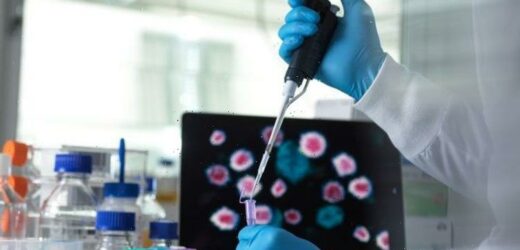Douglas Ross says restrictions haven't reduced covid numbers
We use your sign-up to provide content in ways you’ve consented to and to improve our understanding of you. This may include adverts from us and 3rd parties based on our understanding. You can unsubscribe at any time. More info
The protein is NS2 of Respiratory Syncytial Virus (RSV). A study has found that if the body lacks this protein, the body’s immune response can destroy the virus before severe inflammation starts. The researchers claim this might give information to deter pneumonia-which causes the body’s severe inflammatory response to respiratory viruses. This includes the virus that causes COVID-19.
Like other respiratory viruses, including Covid, RSV infects the lung cells responsible for exchanging gases.
The protein uses them as factories to make more viruses.
But uncontrollable virus multiplication in these cells leads to their destruction and can result in severe inflammation.
This causes lung diseases like pneumonia and can result in death.
The study was done by researchers at Washington State University’s College of Veterinary Medicine.


Kim Chiok, a WSU post-doctoral researcher who led the study, said: “Exaggerated inflammation clogs the airways and makes breathing difficult.
“This is why people who have these long-term and severe inflammatory responses get pneumonia and need help breathing, and it’s why they end up in the hospital in the ICU.”
Now, the researchers are laying the framework to break that cycle by getting a better understanding of how respiratory viruses stay in the cell.
RSV causes 160,000 deaths each year, mainly in primarily in infants, children, elderly people and immune-compromised individuals.
That is according to National Institute of Allergy and Infectious Diseases.

The researchers worked out the viral proteins’ functions by using viruses without genes that code for different viral proteins.
They compared these to a wild strain of the virus.
Ms Chiok said: “The virus has a series of tools, some tools with multiple functions, we wanted to learn about these tools by essentially taking them away.”
Each tool is a different viral protein.
The viral NS2 protein was found to be key regulator of autophagy.
DON’T MISS
Scholz cripples to Putin’s pressure and fails to sanction Russia [REPORT]
Scientists discover new approach to beat antibiotic-resistant bacteria [INSIGHT]
Egypt news: ‘Strange’ spots discovered in Tutankhamun’s tomb explained [REVEAL]

This is a cellular process that regulates immune defence during virus infection.
When the virus enters the cell, a cellular protein called Beclin1 can recognise the threat.
But RSV’s NS2 protein get penetrate Beclin1’s defences, allowing the virus to persist and replicate within the cell.
It then spreads to other cells, causing damage that sparks an exaggerated inflammatory response from the body.
This is the process that causes airway diseases like pneumonia.

Without the presence of the NS2 protein, the virus is destroyed by Beclin1.
Ms Chiok said: “In a way, you are disabling NS2’s ability to modulate the cell’s immune defence mechanism.
“You can use therapeutics to target that protein, and potentially transfer this concept to other respiratory viruses like influenza A virus and SARS-CoV-2.”
The study was published January 18 in the journal mBio.
Source: Read Full Article


